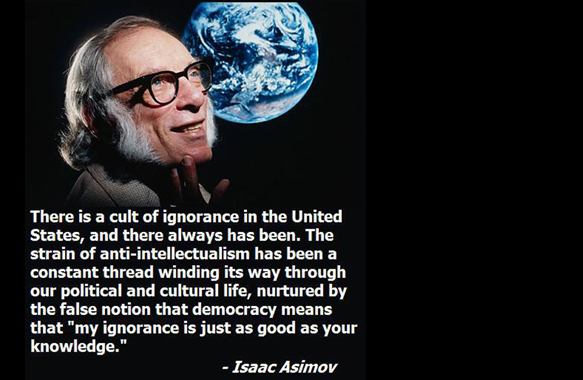By Paul L. Thomas, Ed.D. | Originally Published at the Becoming Radical. March 31, 2013
Writing in Newsweek (1980, January 21) in the cusp of America’s shift into the Reagan era of conservatism that included the roots of the current education reform movement built on accountability, standards, and high-stakes testing, Isaac Asimov declared the U.S. “a cult of ignorance,” explaining:
There is a cult of ignorance in the United States, and there always has been. The strain of anti-intellectualism has been a constant thread winding its way through our political and cultural life, nurtured by the false notion that democracy means that “my ignorance is just as good as your knowledge.”
While science fiction (SF)—a genre within which Asimov is legendary—is often misread as prediction (SF is often allegorical or a critical and satirical commentary on the contemporary world, more so than predictive), Asimov’s brief essay is eerily prescient about the most recent education reform movement and the discourse surrounding it.
As Reagan ascended the presidency in the U.S., Asimov noticed a clear line being drawn by politicians between them as spokespeople for and with the public versus intellectuals, academics, and experts of all kinds. One shift Asimov observed was a move away from the 1960s “Don’t trust anyone over 30″ to a new conservative “Don’t trust the experts.”
In America, it seems, economic elitism was desirable but intellectual elitism was to be avoided at all costs.
Asimov noted both the central importance of a powerful, independent, and critical media along with the inherent problem of how well equipped the public is to gain from such a media (if one exists). While I find Asimov’s concern for Americans’ literacy too flippant and suffering (ironically) from his own blindspot as an expert writer who likely was far less expert in the broader field of literacy and literacy instruction (his advanced degrees are in chemistry), he did make a credible though garbled call for critical literacy among an American public that is functionally literate:
[T]he American public, by and large, in their distrust of experts and in their contempt for pointy-headed professors, can’t and don’t read.To be sure, the average American can sign his name more or less legibly, and can make out the sports headline—but how many nonelitist Americans can, without undue difficulty, read as many as a thousand consecutive words of small print, some of which may be trisyllabic? [1]
Asimov eventually raised an important question about the right to know among a free people, the role of the media, and the need for an educated public in a free and democratic society:
I contend that the slogan “America’s right to know” is a meaningless one when we have an ignorant population, and that the function of a free press is virtually zero when hardly anyone can read….
I believe that every human being with a physically normal brain can learn a great deal and can be surprisingly intellectual. I believe that what we badly need is social approval of learning and social rewards for learning.
We can >all be members of the intellectual elite and then, and only then, will a phrase like “America’s right to know” and, indeed, any true concept of democracy, have any meaning.
As we time-travel forward thirty-three years, Asimov has offered the current education reform template as well as the tremendous hurdle facing teachers, researchers, and scholars seeking to raise their voices of expertise and experience against a political and public commitment to a cult of ignorance: Don’t trust experts, but do trust politicians, celebrities, and billionaires.
Asimov’s essay, with only a few edits, could easily be written today and aimed squarely at the education reform movement. Secretary Duncan, Bill Gates, and Michelle Rhee warn the American public not to listen to the experts—teachers, researchers, and scholars.
That discourse remains robust as long as the media reports and perpetuates that political message and as long as formal education remains primarily bureaucratic, insuring that schools fail to foster critical literacy while the consumer culture feeding on entertainment keeps the public so busy and distracted that few bother to consider the danger ignoring experts poses to both freedom and democracy.
The political and economic elites benefit themselves from marginalizing and demonizing educators and the educated (the expert); the political and economic elites also benefit indirectly and directly from keeping universal public education in the most reduced form possible, exactly what accountability, standards, and high-stakes testing insure.
The education reform movement’s commitments to Common Core State Standards, national high-stakes tests, teacher evaluation linked to those tests, and chain-type charter schools are not quests for a better educated American public, but strategies for further entrenching the U.S. in the cult of ignorance Asimov unmasked over three decades ago.
[1] Asimov’s immediate school bashing based on test scores suggests he, too, was a victim of careless attention to the facts.












Leave A Comment